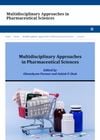 48 citations,
July 1996 in “Human & Experimental Toxicology”
48 citations,
July 1996 in “Human & Experimental Toxicology” Human enzymes can detoxify harmful substances but might also increase their cancer risk.
 37 citations,
March 2010 in “British Journal of Dermatology”
37 citations,
March 2010 in “British Journal of Dermatology” Oestrogen and thyrotropin-releasing hormone affect prolactin and its receptor in human skin and hair, suggesting new treatment options for related conditions.
 17 citations,
December 2004 in “Bioorganic & Medicinal Chemistry Letters”
17 citations,
December 2004 in “Bioorganic & Medicinal Chemistry Letters” Scientists found new, better-working inhibitors for a hormone-related enzyme.
 September 2024 in “International Journal of Molecular Sciences”
September 2024 in “International Journal of Molecular Sciences” High doses of testosterone disrupt hormone levels and receptor expression in the uterus, affecting fertility.
 11 citations,
July 2001 in “APMIS. Acta pathologica, microbiologica et immunologica Scandinavica./APMIS”
11 citations,
July 2001 in “APMIS. Acta pathologica, microbiologica et immunologica Scandinavica./APMIS” Estrogens are key for bone growth spurts in both boys and girls and affect growth into adulthood.
 1 citations,
January 2003 in “Expert Opinion on Therapeutic Patents”
1 citations,
January 2003 in “Expert Opinion on Therapeutic Patents” Steroid sulfatase inhibitors could potentially treat hormone-related disorders like certain cancers, hair loss, acne, and improve cognitive dysfunction.

Different drugs are used to manage breeding, prevent or end pregnancy, and treat reproductive issues in dogs and cats.
 6 citations,
September 1998 in “The Journal of The British Menopause Society”
6 citations,
September 1998 in “The Journal of The British Menopause Society” Testosterone replacement may help postmenopausal women with sexual function and bone density, but suitable treatments are limited.
 December 2022 in “Cureus”
December 2022 in “Cureus” Hormones significantly influence hair growth, with conditions like hirsutism and patterned hair loss linked to hormone levels; more research is needed for full understanding.
 173 citations,
May 2001 in “Human reproduction update”
173 citations,
May 2001 in “Human reproduction update” Oestrogens are key for bone growth during puberty in both boys and girls.
 June 2023 in “The journal of sexual medicine”
June 2023 in “The journal of sexual medicine” The treatment helped a transgender woman stop drinking, improved her mental health, and reduced her gender dysphoria.
 2 citations,
January 1986 in “Dermatology”
2 citations,
January 1986 in “Dermatology” A woman with Kallman's syndrome also developed alopecia universalis, a condition not previously linked to Kallman's.
 102 citations,
January 2003 in “Dermatology”
102 citations,
January 2003 in “Dermatology” Smoking may contribute to hair loss in men.
 49 citations,
April 1997 in “Human reproduction”
49 citations,
April 1997 in “Human reproduction” Hormone therapy for excessive hair growth is as good with GnRHa as with high-dose CPA, but GnRHa has longer-lasting results.
 27 citations,
October 2011 in “British Journal of Dermatology”
27 citations,
October 2011 in “British Journal of Dermatology” ESR2 gene variations may be linked to female pattern hair loss.
 22 citations,
March 2000 in “Clinical endocrinology”
22 citations,
March 2000 in “Clinical endocrinology” Most patients experienced hirsutism again after stopping hormone treatment, indicating long-term treatment is needed to maintain results.
33 citations,
December 2017 in “Journal of neuroendocrinology” Sex and stress steroids quickly change brain cell structures in the hippocampus.
 September 2002 in “Fertility and sterility”
September 2002 in “Fertility and sterility” Female relatives of PCOS patients have a higher chance of showing PCOS symptoms.
 June 2022 in “Foodsci: Indian journal of research in foods and nutrition”
June 2022 in “Foodsci: Indian journal of research in foods and nutrition” Eating better, exercising, staying clean during periods, and learning about health can help reduce menstrual problems and improve life quality.
31 citations,
September 2020 in “Clinical endocrinology” Some antiandrogens may lower testosterone better than others, but it's unclear which is best for feminization in transgender women; more research is needed.
April 2022 in “Medical Molecular Morphology”  March 1987 in “Journal of The American Academy of Dermatology”
March 1987 in “Journal of The American Academy of Dermatology” Oral spironolactone and isotretinoin are effective for treating acne.
 6 citations,
February 1974 in “The BMJ”
6 citations,
February 1974 in “The BMJ” The document concludes that scalp disorders can be treated with hair washing, specific shampoos, medications, and sometimes surgery or hair transplants, but hereditary baldness is untreatable.
 February 2023 in “Pakistan Journal of Medical and Health Sciences”
February 2023 in “Pakistan Journal of Medical and Health Sciences” Pregnancy can cause various skin changes, with stretch marks, dark lines on the abdomen, and skin darkening being the most common.
14 citations,
January 1980 in “Journal of steroid biochemistry/Journal of Steroid Biochemistry” Both treatments reduced androgen levels and hair growth in women with hirsutism.
 May 2024 in “Scientific Reports”
May 2024 in “Scientific Reports” Androgen receptors in the mouse brain may explain cognitive and mood changes in prostate cancer treatment.
 9 citations,
August 2000 in “Journal of Periodontal Research”
9 citations,
August 2000 in “Journal of Periodontal Research” Finasteride reduces testosterone conversion, progesterone lessens this, and levamisole enhances finasteride's effect.

Herbal remedies like liquorice and aloe vera may help manage PCOS symptoms.

Antiepileptic drugs can cause cosmetic side effects and affect menstrual cycles, fertility, and bone health in women with epilepsy.
 77 citations,
July 2013 in “Best Practice & Research in Clinical Obstetrics & Gynaecology”
77 citations,
July 2013 in “Best Practice & Research in Clinical Obstetrics & Gynaecology” Menopause reduces skin collagen and elasticity, and while estrogen therapy can help, its risks require careful consideration.


























